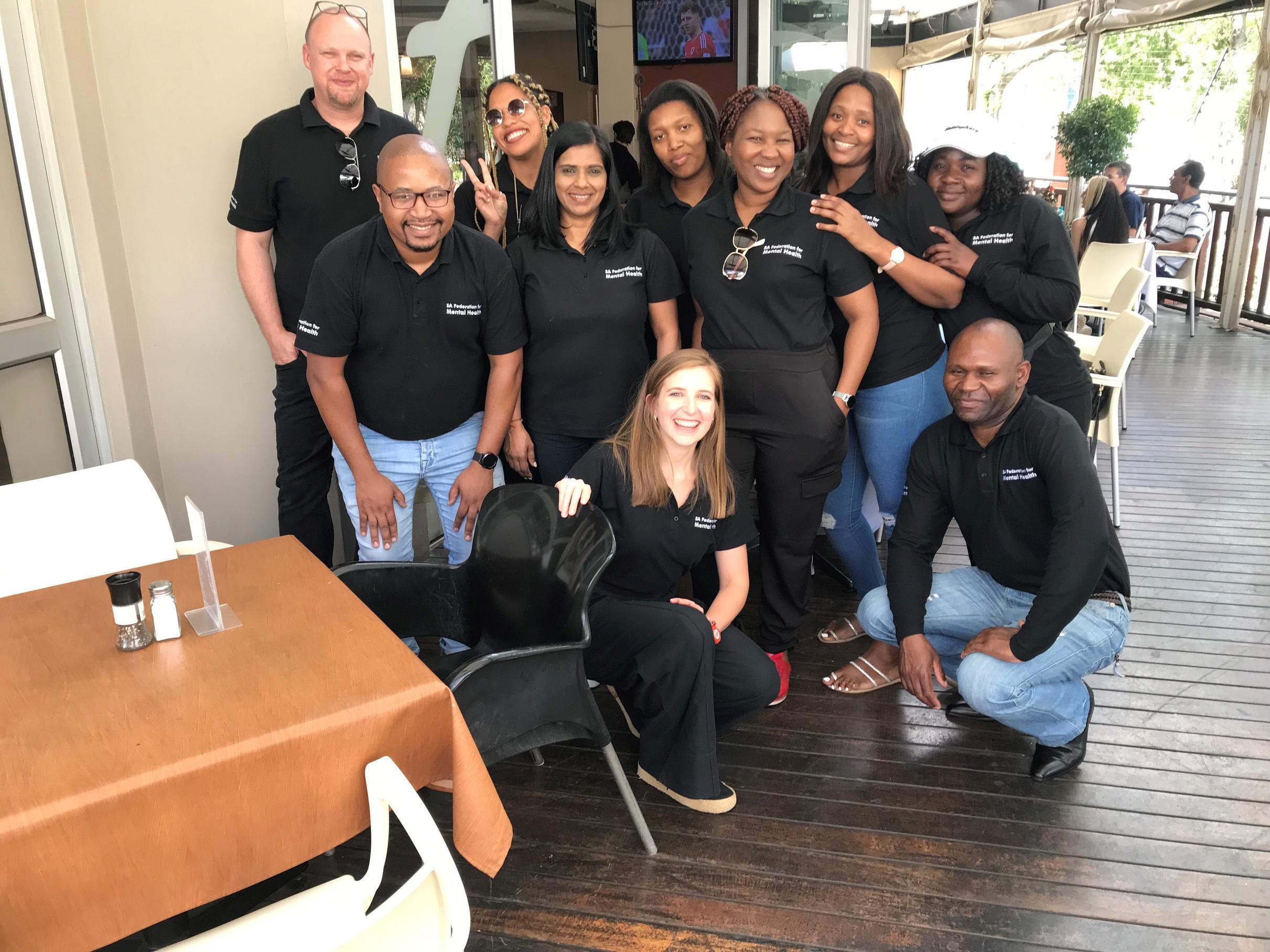ANNUAL REPORT
APRIL 2022 - MARCH 2023



APRIL 2022 - MARCH 2023


Collective Trauma eminates from escalating crimes, a declining economy and uncertainty about the future of our country. People from every province are facing kidnappings, car hijackings, political killings, genderbased violence, property dispossession and hunger –the list is endless.
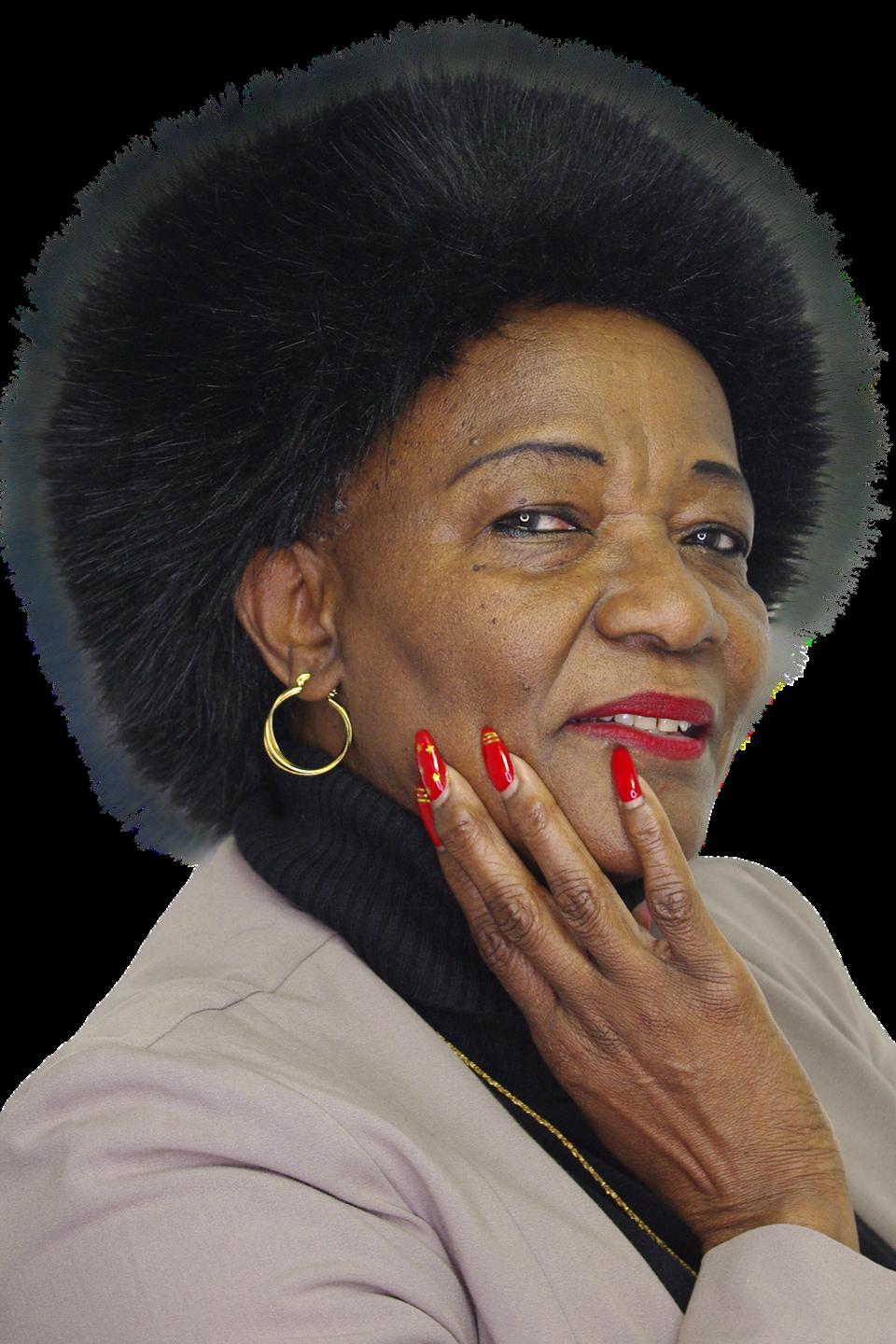
Collective trauma refers to a traumatic event that is shared by a group of people. It may involve a small group, like a family, or it may involve an entire society. People don’t necessarily need to have experienced the event firsthand to be changed by the trauma. Watching the events unfold on the news can be traumatic, for example.
Well-known collective traumas include the Holocaust, Apartheid in South Africa, and the COVID-19 pandemic, to mention but a few The impact of loadshedding, corruption, racism, and apartheid, should never be underestimated as it has material manifestations in the life of our country.
Traumatic experiences can lead to a variety of physiological, social, relational and spiritual responses. Such experiences may cause a massive shift in the way people in a culture behave, feel, work together, and raise their children.
We as mental health practitioners must be alive to mass trauma in the communities we serve. We must recognise that such experiences affect the psyche of a whole society, leading to large-scale mental ill health.
Our Mental Health Societiesled, guided and supported by the Federation’s National Office, are doing sterling advocacy work and awareness campaigns already. This should not however, make us complacent as more and more people in our society are traumatised because of the myriad challenges South Africa is currently facing.
We need to always remember that a traumatic situation may alter a person ’ s capacity to cope with stress. People may struggle with sleep, constant anxiety, depression, panic attacks and psychosomatic conditions.
Traumatic experiences shared by entire groups lead to a dysfunctional society. We must seek to reduce this trauma to prevent further dysfunction.
Mental health is on everyone ’ s lips and communities look up to us for guidance and support since we are an organisation that promotes mental health and advocates for improved mental health services for all in South Africa. Let us not fail them.
In our desire to address this collective trauma, we should not ignore our personal trauma experiences. We too are part of the traumatised collective which is South Africa. You cannot give what you do not have. Self-care is crucial.
Therecentpartnerships forgedwithacademic institutions,fundersand like-mindedinstitutions arecommendableand shouldbestrengthened andsustainedinthe interestofpromoting collectivementalhealth wellnessandreducing collectivetrauma.
Prof Sheila Mokoboto-Zwane President, SA Federation forMentalHealth
COVID-19 EXPOSED THE MENTAL HEALTH NEEDS OF EVERYONE, EVERYWHERE. Globally and nationally, already struggling health systems failed to provide adequate care to people with mental health conditions while trying to meet their population's general mental health needs. During the pandemic, the Mental Health Policy Framework and Strategic Action Plan (MHPF) 2013-2020 lapsed, leaving an even bigger void in South Africa's mental health services. The World Health Organisation's World Mental Health Report 2022 confirmed that health systems globally needed transformation, and South Africa is no exception.
SAFMH, in collaboration with various stakeholders, advocated for the review of the MHPF. This was finalised in March 2023. The MHPF 20232030 features several opportunities for robust implementation. The policy highlights the critical role played by NGOs in providing community based mental health services and ultimately increasing access to mental health services. The MHPF also has a sharp focus on child and adolescent mental health care, including addressing the increasing rates of suicide among young people.
SAFMH strives to engage all stakeholders to support the implementation of the revised MHPF. Successful implementation of the policy requires resourcing, multisectoral collaboration, and ongoing monitoring and evaluation.
We are extremely concerned by the ongoing cuts in government funding towards community-based mental health services. This is against the policy directives. We remain hopeful that the lack of understanding by duty bearers of the need for community-based mental health services provided by NGOs can be addressed by targeted awareness and education programmes. We are forever indebted to our loyal donors who make it possible for us to mobilise our advocacy and awareness programmes.
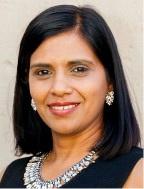
NationalExecutive Director,SAFederation forMentalHealth
IT IS A PRIVILEGE AND AN HONOUR TO REPRESENT MENTAL HEALTH CARE USERS ON THE SAFMH BOARD THIS YEAR. Serving on the SAFMH Board taught me there are people willing to fight for the rights of mental health care users.
As the current chairperson of the Cape Consumer Advocacy Body, I have learned a lot about the importance of advocacy in the mental health sphere. The voices of mental health care users have been muffled for a long time. This needs to change drastically and immediately. Mental health care users must equip themselves with the knowledge of their rights and make themselves heard.
I want to motivate all mental health care users to set goals for themselves and reach for the stars. We are capable of doing so much more than what we give ourselves credit for. We should not let society pre-determine our worth.
I have been involved in various activations that aim to empower mental health care users in different aspects. I have also participated in webinars and conferences that increased my knowledge of mental health care users ' needs. As a result, I have grown as a person.

There is a great need for mental health education in all aspects of society. Ignorance is a huge contributor to stigma against mental health care users. Knowledge is power and mental health care users must play an active role in educating society about mental health conditions.
I want to thank SAFMH for all they have done for me thus far. I look forward to the knowledge I will gain in the future. May SAFMH grow from strength to strength and continue to be a beacon of hope.
The South African Federation for Mental Health (SAFMH) is a national, human rights organisation with a 100-year track record of creating a society where mental health is better prioritised. We work to ensure rights-based and evidence-based mental health services are included within South Africa’s policies, systems, and care. Our Mission is to work with the community and key stakeholders to achieve the highest possible level of mental health for all. Our Board is constituted of provincial representatives from the Mental Health Societies. The Mental Health Societies are independent organisations with their own governance and finance structures. These organisations provide mental health services to communities that are often vulnerable and under-resourced.
The map shows the national reach of SAFMH and the location of the Mental Health Societies.
Protecting and advocating for the rights of mental health care users
Ensuring that the voices of mental health care users, their families, and the wider South African public are heard
Working with community-based mental health organisations towards quality, sustainable, and consistent mental health services
community
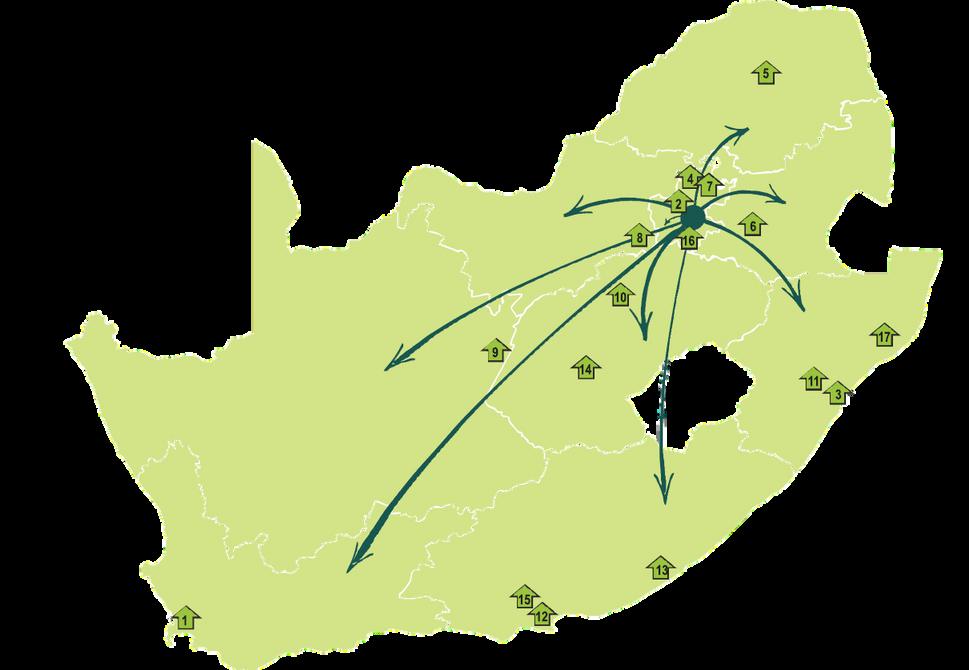
1CapeMentalHealth
2CentralGautengMentalHealth
3Durban&CoastalMentalHealth
4LaudiumMentalHealth
5LimpopoMentalHealth
6MpumalangaMentalHealth
7NorthGautengMentalHealth
8NorthWestMentalHealth
17ZululandMentalHealth Raising awareness of mental health and providing mental health information
9NorthernCapeMentalHealth
10NorthernFreeStateMentalHealth
11PietermaritzburgMentalHealth
12IndlelaMentalHealth
13RehabSouthernwood
14SouthernFreeStateMentalHealth
15UitenhageMentalHealth
16VaalTriangleMentalHealth
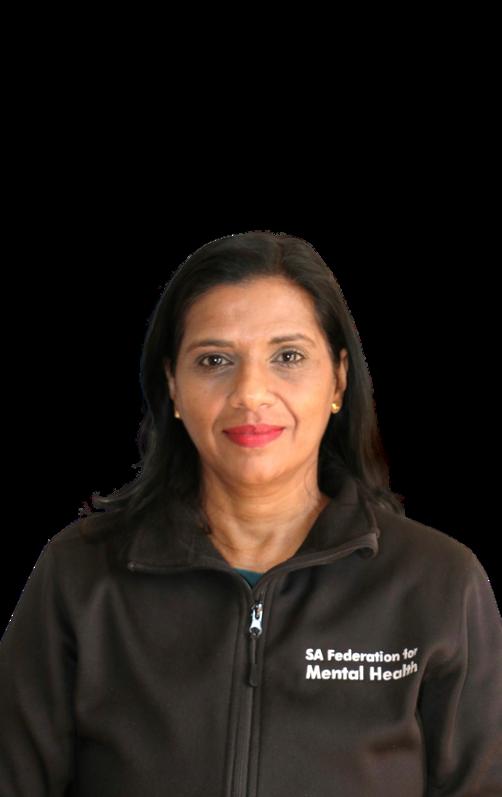
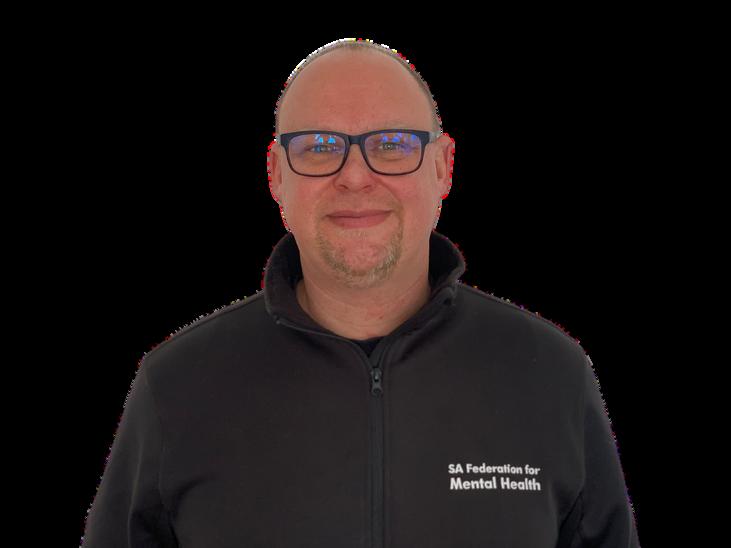
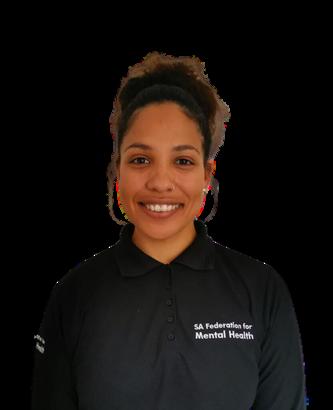
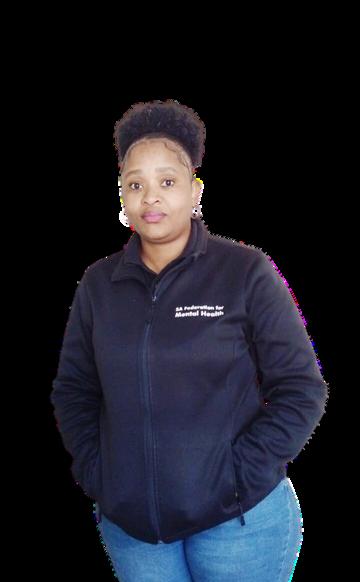
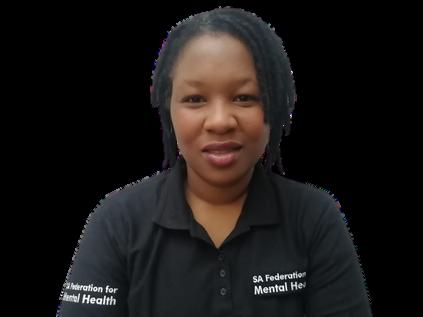
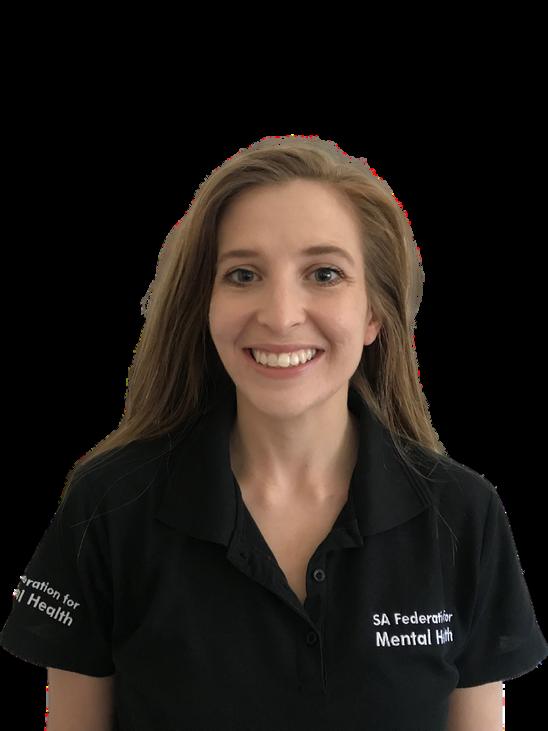
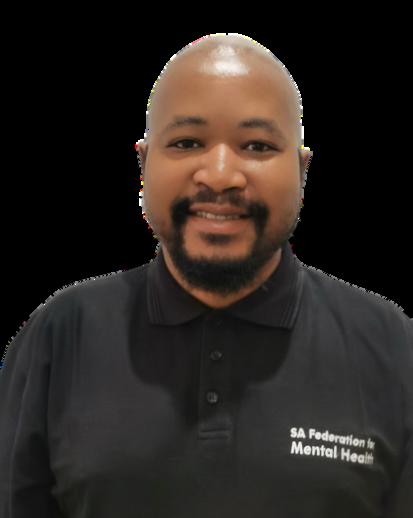


Legalsupportreferralsfor 22 CASES including for 6 reportsof humanrightsviolations

Our mental health advocacy work aims to change major structural and attitudinal barriers to achieving positive mental health outcomes for everyone in South Africa
Achievementsfrom2022include:
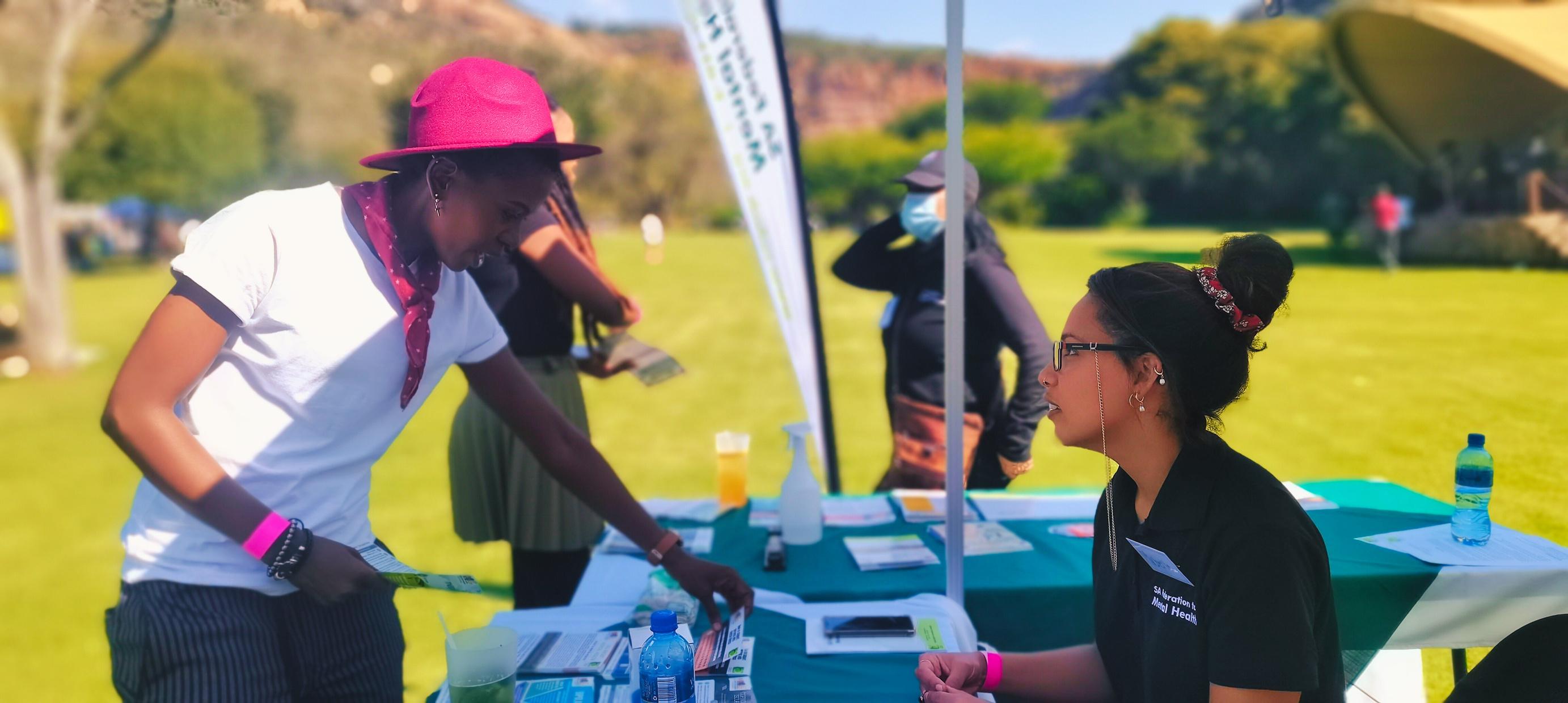
2
1 Participated in the policy review process for the 2023-2030 Mental Health Policy Framework
Launched our Universal Health Coverage Strategic Advocacy Plan with support from United for Global Mental Health
Submitted comments on 6 draft legislation and policy with 4 National Government Departments
3 Partnered with the South African Disability Alliance to develop the forthcoming National UNCPRD Shadow Report
5
4 Collaborated to strengthen the integration of mental health services and funding into HIV/TB policies and services
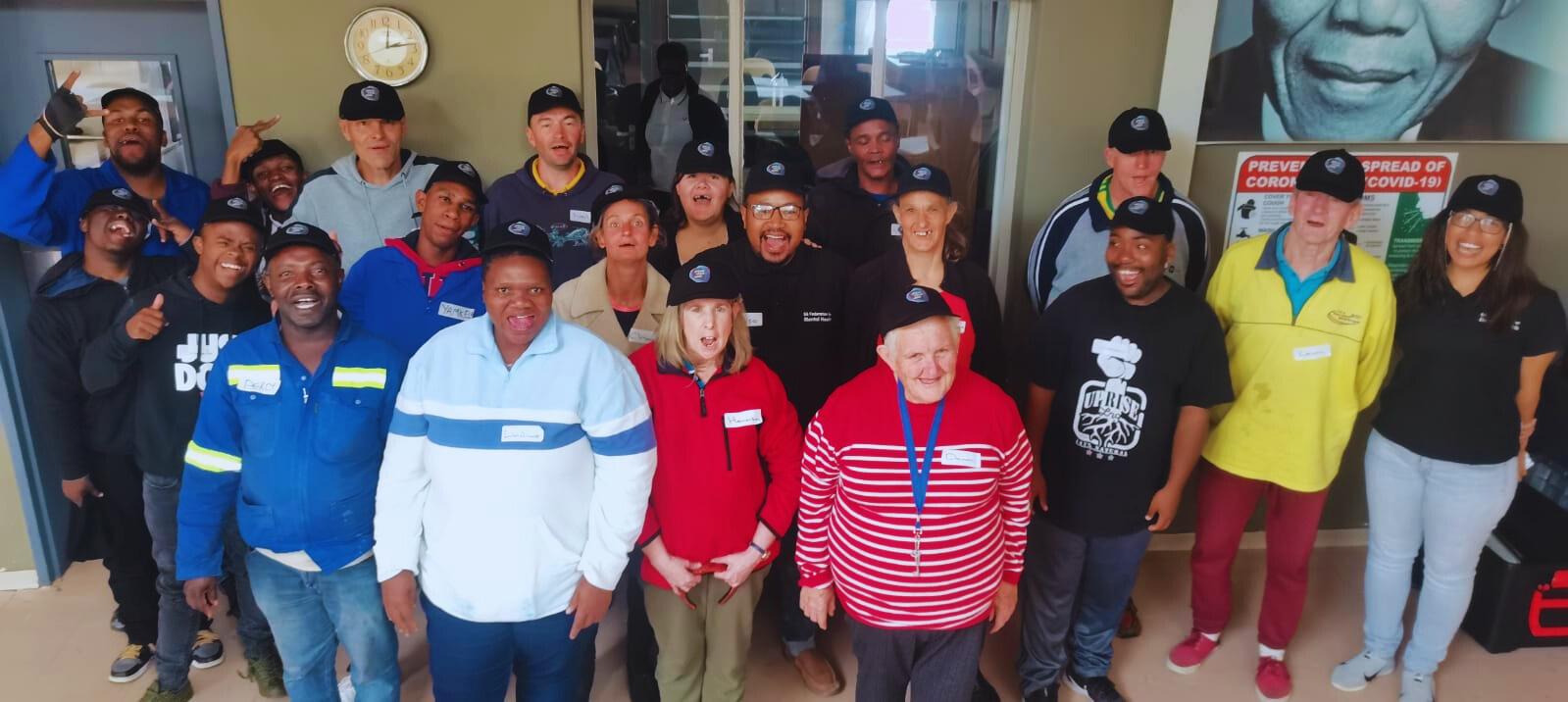
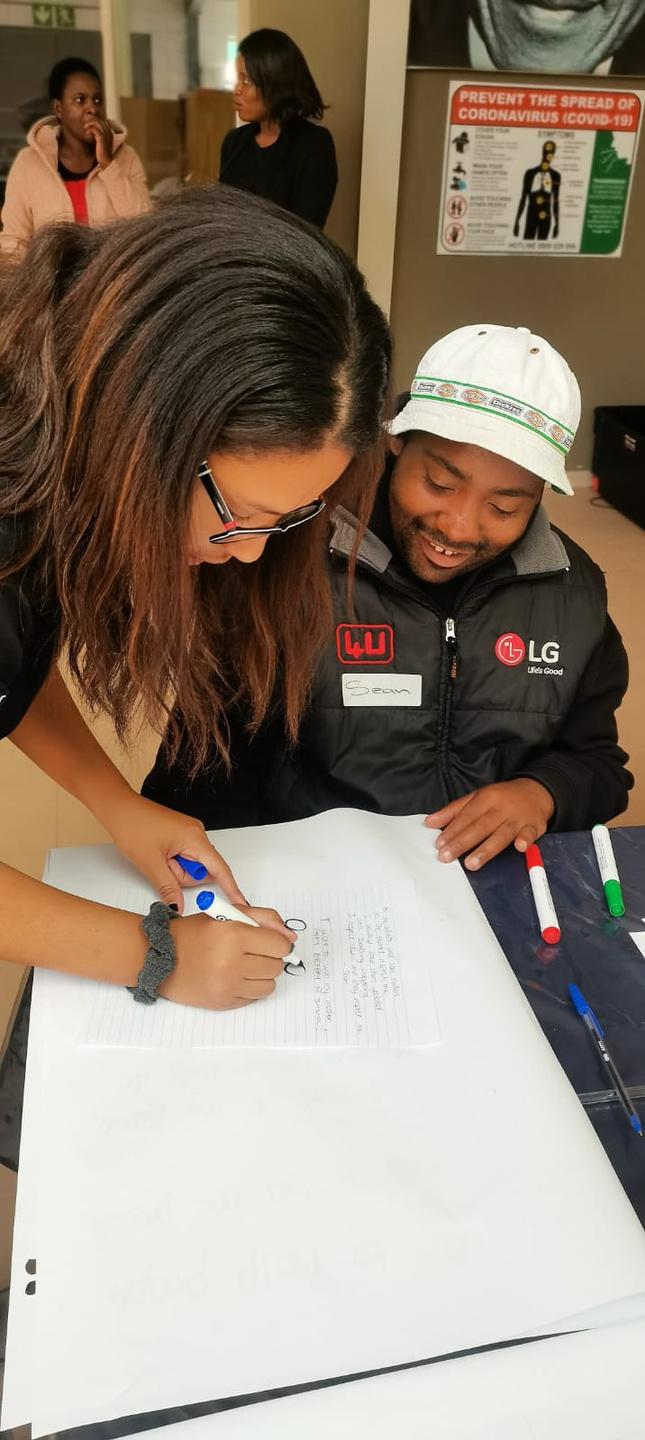

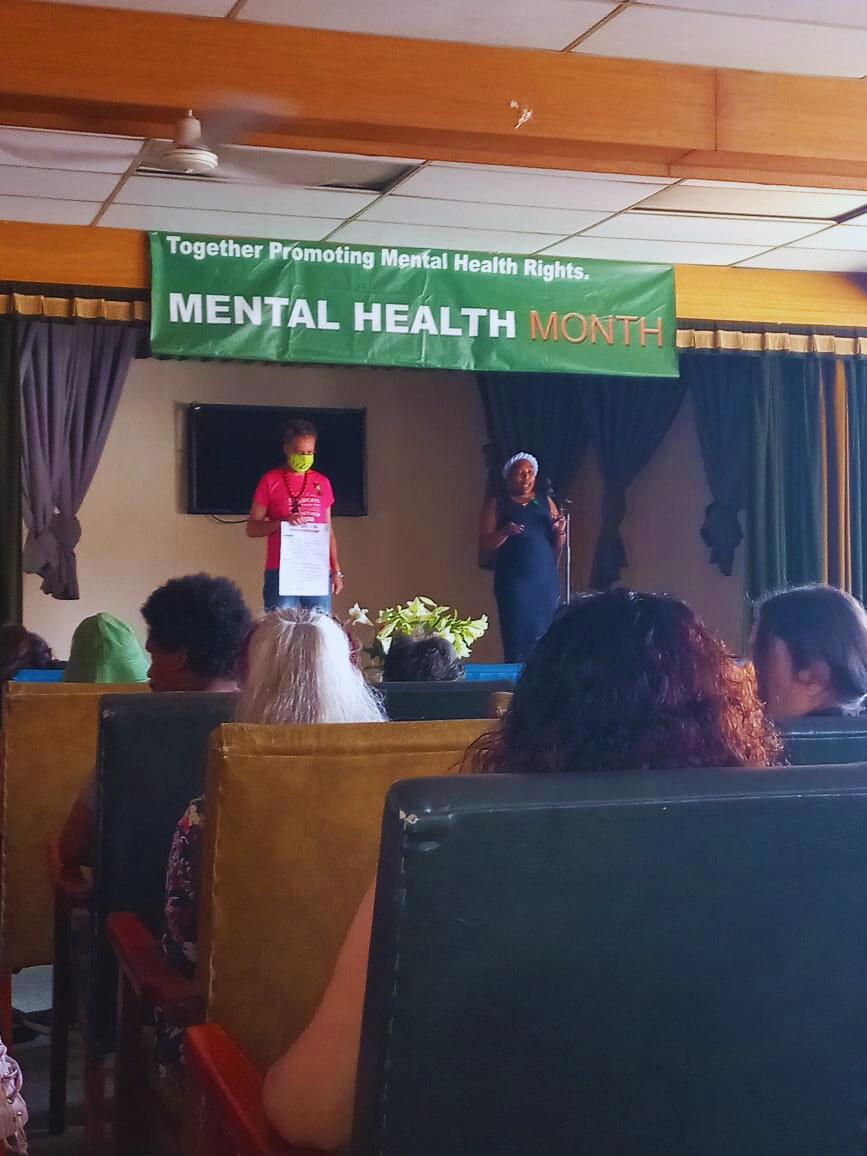

LeondeBeerwitha residentatTheLITTLE EDENSocietyduring theirannualCEO WheelchairChallenge
PDAM2022
Psychosocial Disability Awareness Month (PDAM) is celebrated annually in July. For 2022 our theme was “In My Own Words”, focusing on self-advocacy and storytelling to amplify the voices of mental health care users, with the aim of highlighting the need for inclusion, acceptance and reducing stigma. The campaign called for persons with lived experience of mental health conditions to share their stories, in any medium they wished, and we compiled these into a digital magazine, which we published. You can read it here.
WorldMentalHealth AwarenessMonth2022 IDAM2023
The global theme for World Mental Health Day (WMHD) 2022 was “Make mental health & wellbeing for all a global priority” and as SAFMH we felt that this theme needed to include a local, community-focus as well. Our sub-theme was ‘shifting attitudes’ to reduce stigma, discrimination and misinformation relating to mental health. We invited people to reflect on how their attitudes towards mental health hinder or promote mental health becoming a national and global priority. Read the WMHD press release here.
Intellectual Disability Awareness Month is commemorated annually in March. “Destigmatising Intellectual Disability Through Shifting Attitudes” was the 2023 theme. We called on the media and the public to reflect on their attitudes to intellectual disability and how these attitudes might lead to stigma, discrimination and exclusion. We also hosted an in-person event with the residents at The Hamlet Foundation to understand their views and experiences of stigma, and how they believe we start shifting attitudes to intellectual disability in the country.

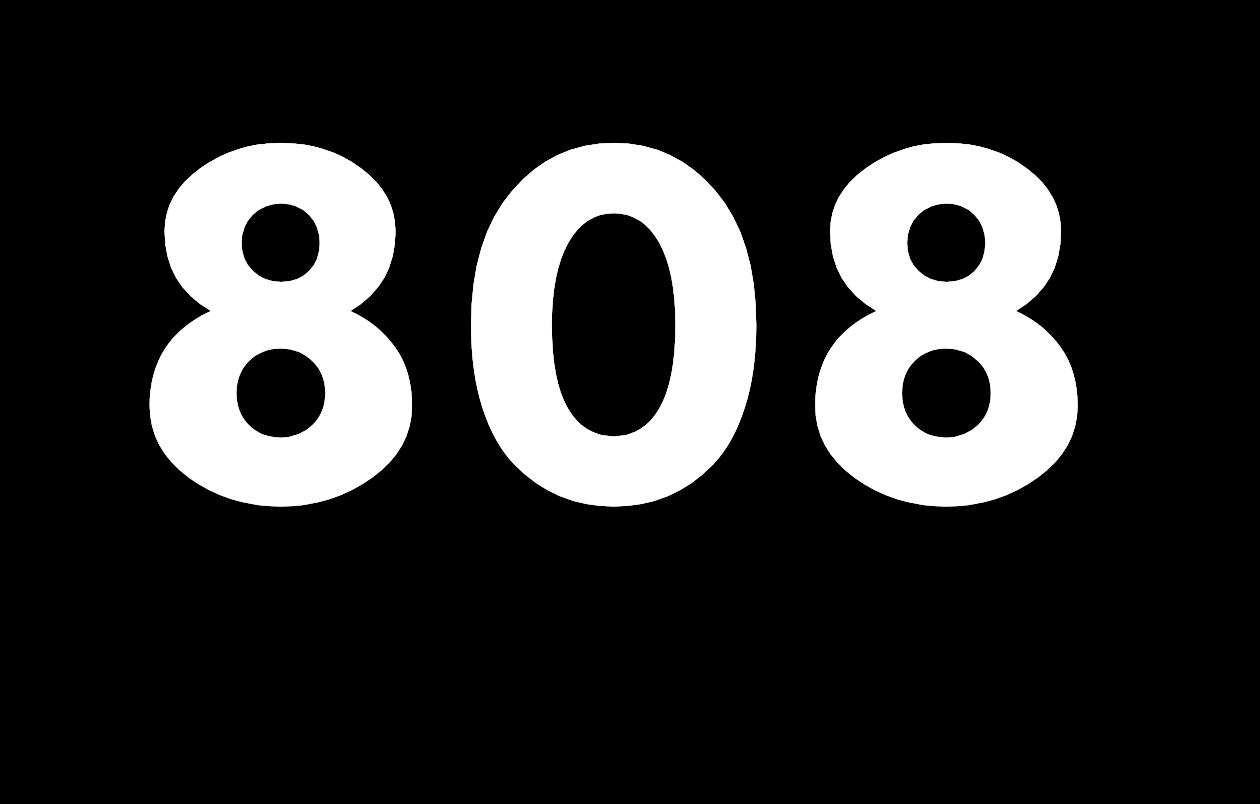
o 24
p etter Editions
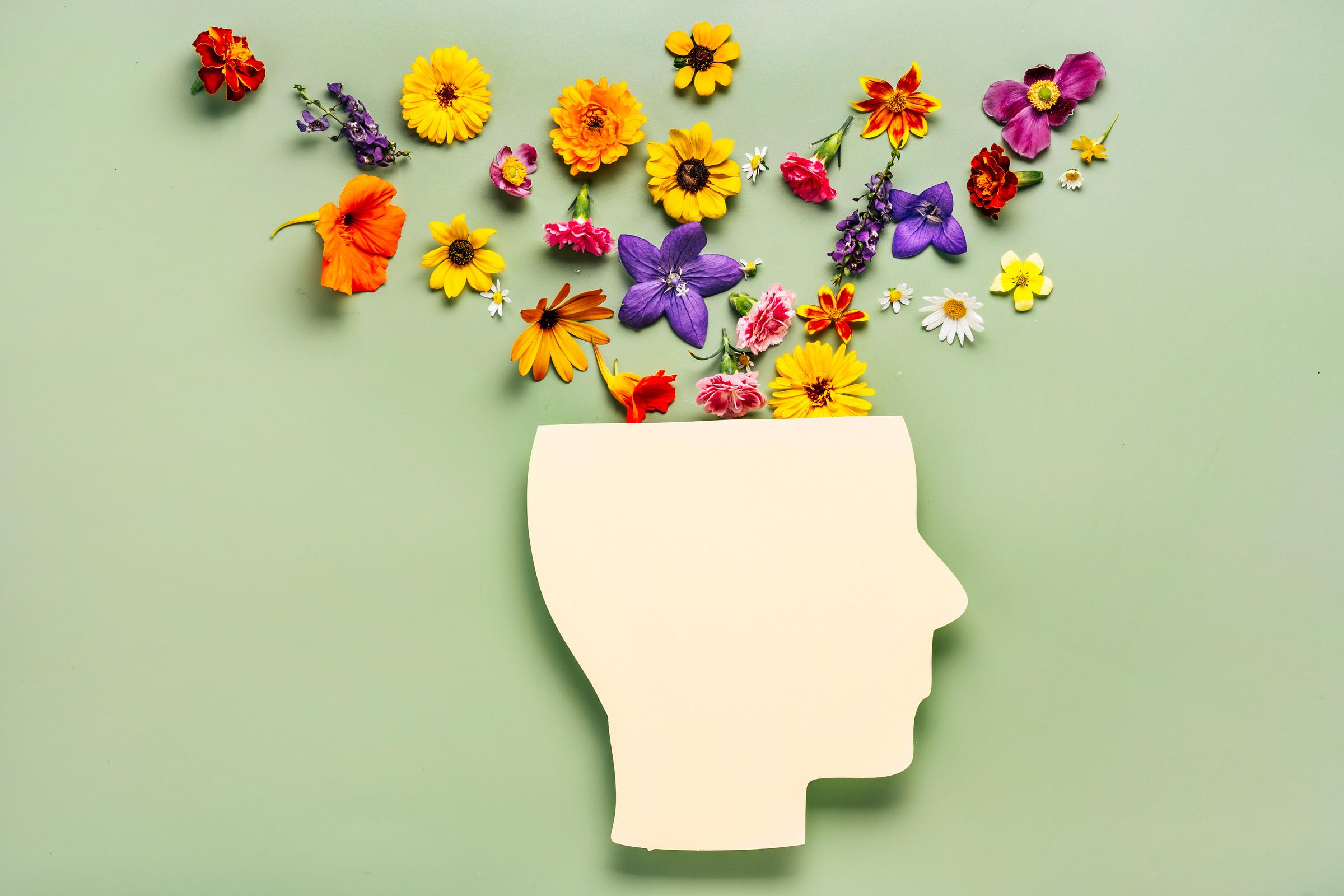
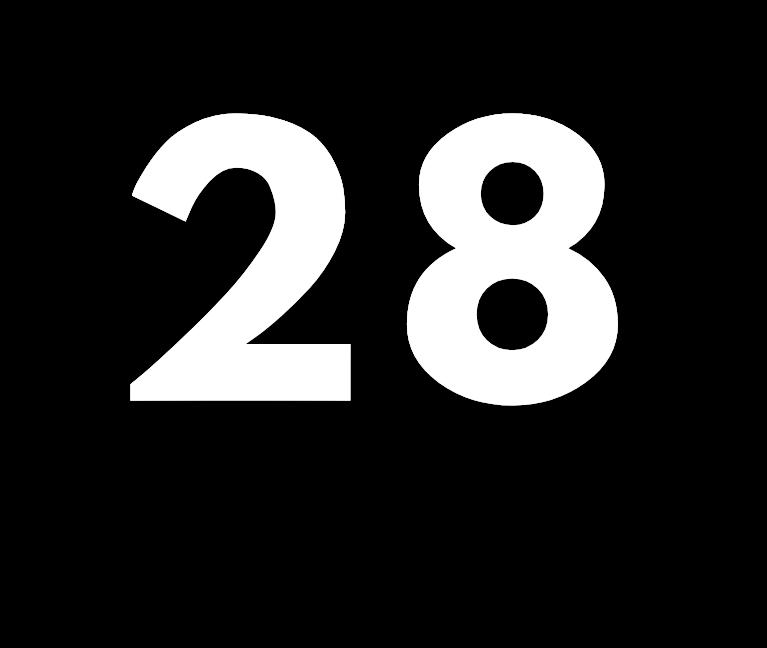
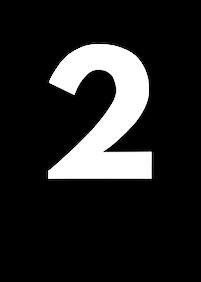
National campaigns run

Facebook and Twitter awareness presentations n the media
Over the past year, in partnership with the National Department of Health's Mental Health Directorate, the SAFMH helpdesk provided support and information to 1,088 individuals. The helpdesk is a port of call for members of the public who require signposting to mental health services in South Africa. SAFMH keeps all our referral databases up to date to ensure the public receives the most recent information. Enquiries are received via our website, WhatsApp line, office landline, email and social media.
The helpdesk provides legal referrals for persons who have been victims of human rights abuses. We recorded 6 human rights violations this past year. We strive to ensure that people with psychosocial and intellectual disabilities can easily report such violations and help obtain fair access to justice via our legal partners.
Counseling services, long-term care placement facilities and navigating hospital admissions for mental ill-health are common requests received via our helpdesk
Tumi* contacted the helpdesk stating that her brother was violent and abusive towards their mother and family. Tumi shared that her mother is an ailing pensioner and her brother is 21 years old, unemployed, and not engaged in any educational opportunities. To cope with difficulties in his life, her brother was abusing alcohol and drugs.
Tumi requested advice on how to have her brother screened for mental health related issues and admitted to a rehabilitation facility to help him deal with his drug and alcohol use. SAFMH asked Tumi about her brother's place of residence. This made it easier for SAFMH to refer Tumi to her neighbourhood hospital and a rehabilitation centre for her brother to get treatment. After SAFMH followed up with Tumi, SAFMH was pleased to hear that the brother was admitted to a hospital for treatment and discharged a few days later. He was given treatment and is currently on medication.
*not the enquirer's real name
"I am most impressed by SAFMH’s efficiency and care. I will keep these details for future contact."

SAFMH annually collects, collates and analyses statistics from its 17 Mental Health Societies. From the responses we compile a detailed overview of their collective community-based mental health service provision across South Africa, highlighting trends and challenges within the mental health sector. The information guides SAFMH's advocacy work and collaborations with stakeholders and decision-makers, including government.
SAFMH acknowledges the contribution made by the staff of the Mental Health Societies, who work tirelessly to assist mental health care users and their families in the communities they serve. We thank them sincerely for their hard work and the care shown to those who benefit from their services.
Pietermaritzburg Mental Health placed 22 mental health care users in the open labour market.
Limpopo Mental Health delivered more targeted awareness programmes in various community venues.
Indlela Mental Health utilised Asset Based Community Development practices to capacitate communities to become more self-sufficient.
Durban & Coastal Mental Health worked with the Department of Education to integrate more specialised services into their daycare centres for children with severe and profound intellectual disability.
Durban & Coastal Mental Health was placed on suspension by SAFMH to correct governance compliance, with ongoing guidance from SAFMH to address this.
Northern Cape Mental Health: struggled to recruit quality and qualified mental health professionals for services as professionals move to larger cities.
Pietermaritzburg Mental Health: lockdown affected service delivery; social workers were unable to conduct home visits and mental health care users and families were unable to come to offices.
Zululand Mental Health partnered with the Department of Agriculture to provide seedlings and fertilisers for their protective workshop.
Laudium Mental Health built a new IT centre to train beneficaries in basic computer skills.
Cape Mental Health created a curriculum and provided training to Department of Health managers on supporting persons with mental health difficulties at work.
Indlela Mental Health continued its RISE Project at 6 schools in Gqeberha to challenge stigma and promote mental wellness.
Cross-cuttingprioritiesformanyMentalHealth
Societiesinclude:Reachingnewgeographicalareas, developingstrongersustainabilitystrategies, buildingstaffcapacity,upskillingstaff,increasing accesstomentalhealthservicesatthecommunity levelforpersonswithintellectualandpsychosocial disabilities,andcultivatingbetterpartnershipswith stateandprivatesectorpartners

Agricultureisbeing utilisedbymanyMHSs formentalhealthcare userempowerment
SAFMH takes its responsibility to account to stakeholders and funders seriously and uses various tools listed below to do so.
The SAFMH board comprises of the President (independent expert), two Vice Presidents (independent experts), an Honorary Treasurer (independent expert), two additional independent experts, nine Directors of Mental Health Societies and, two persons with psychosocial and/or intellectual disability. Board members are not compensated for voluntary services rendered to SAFMH.
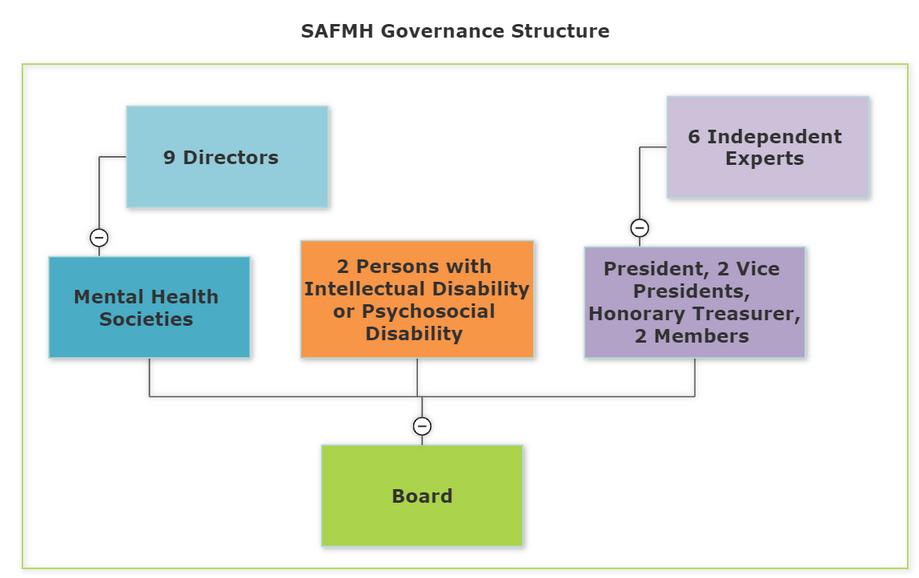
ConstitutionupdatedandstampedbytheNPO Directorate
TaxClearanceCertificate/LetterofGood Standingforalltaxcompliancerequirements
NPOcertificate
NPOReportsubmittedannuallyandstatus updated
BBBEECertificate(includingletterissuedby auditors)
SubmissionofAnnualReport
POPIAcomplianceandregistrationwiththe regulator
UpdatedEmployeeGuide
Employmentcontractsalignedwithlabour legislation
AuditedFinancialStatements
We look forward to the coming year, knowing that mental health has been placed firmly at the forefront of most conversations about health.
Mental health was thrust into the spotlight by the COVID-19 pandemic. Everyone was affected in some way mentally by the resultant lockdowns, physical distancing, widespread loss of livelihoods, and unemployment. We will use this opportunity to make sure mental health is on everyone’s lips –from individual, to societal to government level.
These actions – Protect, Strengthen, Integrate, and Scale Up – underpin our work for the next year and form the framework for our 2023-24 business plan.
We will work harder and do more for persons with lived experience and the general South African public through exploring and implementing innovative strategies to:
Facilitate access to justice for victims of human rights abuses through referrals to affordable and accessible legal services
Raise awareness for everyone to consciously look after their mental health, and their friends, families, and colleagues
Ensure that the human rights principles in international and national policies, laws and treaties are upheld by all stakeholders
We will work harder to strengthen the inclusion of people with lived experience of mental health and young people in our advocacy work by:
Fighting for the inclusion of persons with lived experience of poor mental health in national decision-making spaces
Developing a youth forum to ensure young people contribute to our advocacy goals
Deepening the relationship with the MHSs to utilise the collective of the federation more effectively
We will mobilise organisations, communities, and persons with lived experience into the mental health movement to help us build resources to increase our influence and capacity to address future challenges by:
Being a central hub for mental health resources
Being an influential and innovative advocacy organisation advancing the rights of persons with psychosocial and intellectual disabilities
Promoting more effective implementation of mental health policy and legislation through a multi-sectoral approach
We will function as a coherent national office, implementing effective programmes and supporting our Mental Health Societies to make an impact by:
Improving ways to illustrate our work's impact
Enhancing our policies and practices to focus on persons with lived experience and that they enable an expanding and adaptable mental health movement
Upskilling our staff to work towards striving for the best outcomes possible
FINANCIAL STATEMENTS AS AT 31 MARCH 2023
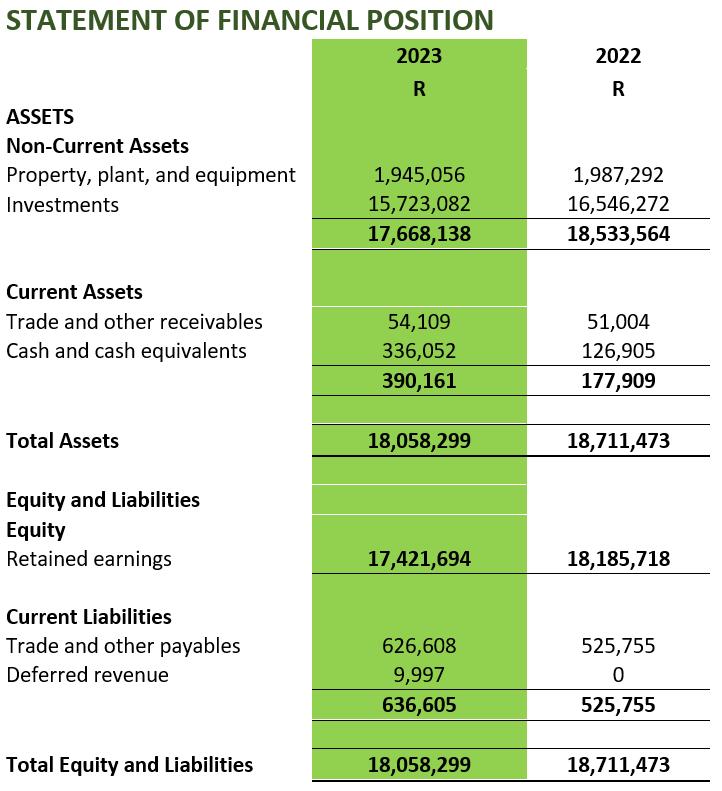

Note: Any potential or existing funders are most welcome to request a full set of our audited financials
We at SAFMH would like to thank our generous donors for their support and for choosing to support our goals. We promise to be responsible stewards of both your donation and your trust.
In excess of R10,000
Between R5,000 and R10,000
The Stirling Foundation
The Carl & Emily Fuchs Foundation Lantrust Charitable Trust
Charl Le Roux

JessicaLong,residentofthe HamletFoundation,participant oftheThroughMyEyescampaign

